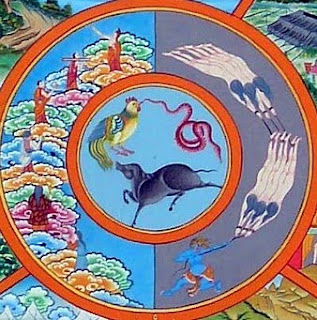The first klesha is attachment, which can be attachment to anything such as food, wealth, pleasure and so on. This is poisonous because being attached to something causes suffering.
The second klesha is aggression. Aggression has many varieties such as hatred, holding a grudge, spitefulness, malevolence and so on. All of these are varieties of the same basic klesha.
The third klesha is apathy, which is a state that arises from ignorance or mental dullness.
The fourth klesha is pride, which in this case is holding yourself to have qualities which you don't possess.
And the fifth is jealousy, which is being unable to tolerate the good things that others enjoy. It's being bothered by the good qualities of others, being bothered by the wealth or pleasure of others and so on.
These five types of kleshas do not normally arise simultaneously. The reason we consider the kleshas problems is that they can simply ruin our lives. They can certainly ruin our practice of dharma and especially our practice of meditation.
So the first step, of course, is recognizing that a klesha has arisen. Normally we don't recognize even that. Normally when a klesha arises it takes hold of us before we are even prepared to admit that it has arisen. At this point, having learned what the kleshas are and having come to admit that they arise has prepared you to recognize and acknowledge them when they do arise.
Although you recognize the arising of the klesha, and although normally we consider kleshas poisonous and problematic, you don't try to stop or get rid of the klesha when it arises. The approach here is identical to that with thoughts in general. When the klesha arises and you recognize such-and-such klesha has arisen in my mind, you don't try to chase it out or stop it, nor do you indulge it. You don't need to stop it because the nature of the klesha is empty, the same as the nature of thought, the same as the nature of mind.
So therefore once you have recognized the arising of whatever klesha it is, then you simply look directly at its nature without altering anything, without attempting to alter your mind or the klesha. As you look at its nature you will experience and recognize its nature. In order to do this of course your mind needs to be somewhat relaxed, but also you need to have a lucid awareness.
Seeing its nature is the same as in the previous case with thoughts in general. While the klesha does not particularly disappear, because its nature is recognized it is no longer poisonous or problematic, and even while it is still present, before it has vanished it becomes an aid to meditation.
Thrangu Rinpoche
